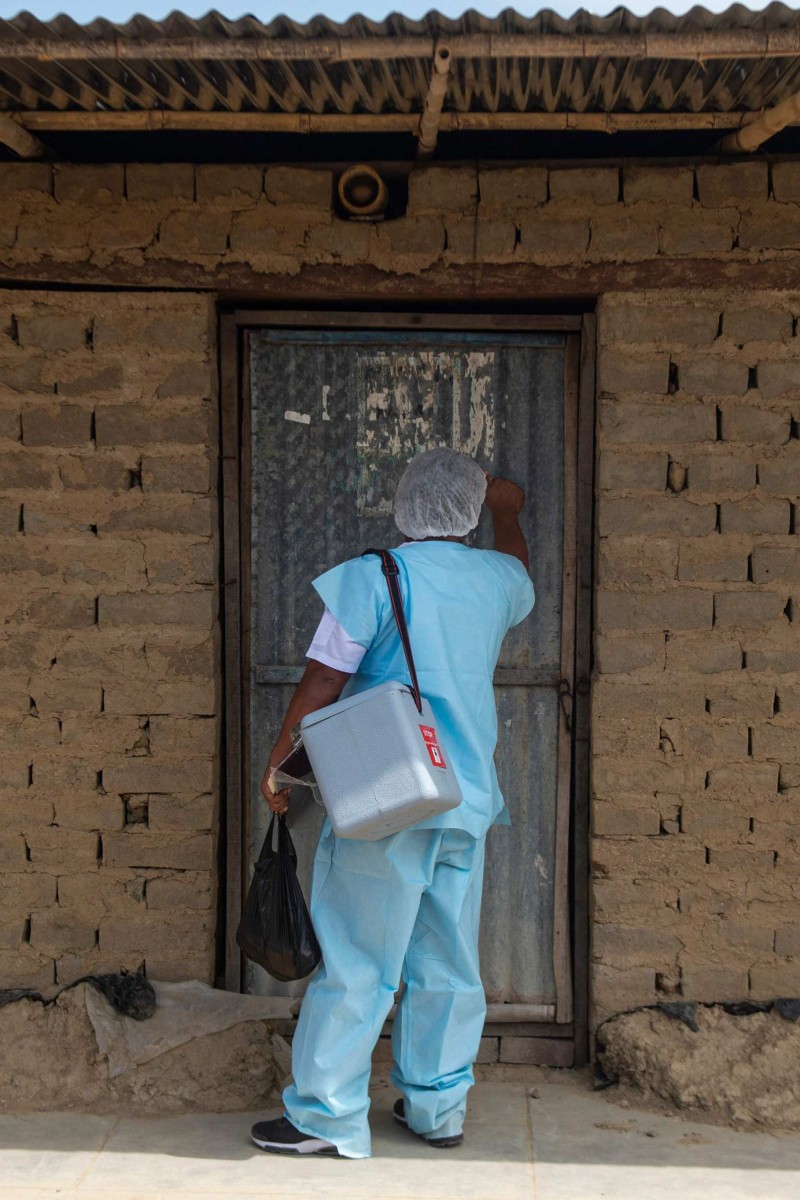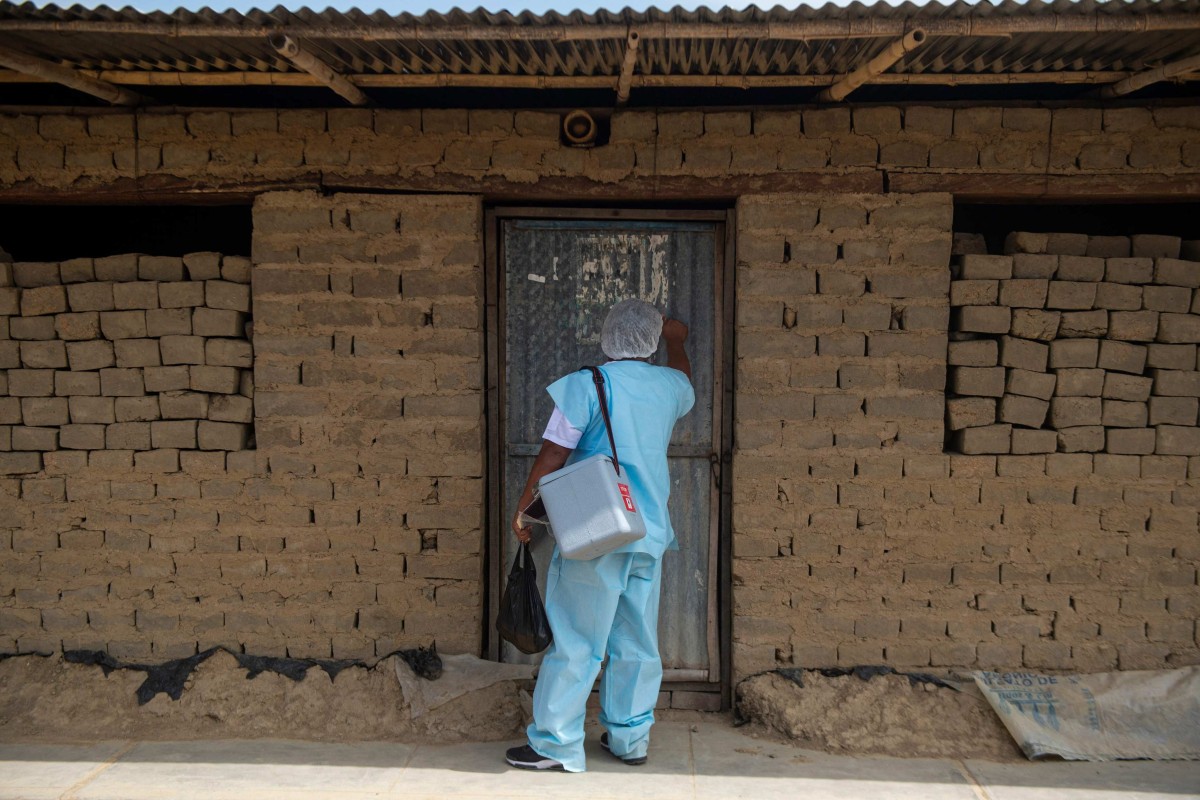
More than 5 million people have died from the coronavirus pandemic. What’s next?
- Experts say the future of the virus depends on the vaccination rate in each country, and the biggest fear is the mutation of the Delta variant
- The World Health Organisation estimates that the real number of deaths from Covid-19 could be three times higher than reported figures
 A health worker knocks on a door in Peru, where people over 24 years of age are being vaccinated with the AstraZeneca/Oxford vaccine against coronavirus. Peru has exceeded 200,000 deaths from the novel coronavirus, the Ministry of Health reported on October 22, 2021, making it the country with the highest global fatality rate per capita from the disease. Photo: AFP
A health worker knocks on a door in Peru, where people over 24 years of age are being vaccinated with the AstraZeneca/Oxford vaccine against coronavirus. Peru has exceeded 200,000 deaths from the novel coronavirus, the Ministry of Health reported on October 22, 2021, making it the country with the highest global fatality rate per capita from the disease. Photo: AFPWith the world set to surpass more than five million deaths from the coronavirus, experts say the pandemic’s future will depend on vaccinations.
The true number of fatalities is believed to be far higher than five million, based on daily reports provided by health authorities in each country.
The World Health Organisation estimates that the overall toll could be two to three times higher than official records, due to the excess mortality linked to Covid-19.
“We’re not out of the woods yet,” says WHO Covid chief
The Economist magazine looked at excess mortality and concluded that around 17 million have died because of Covid.
Excess mortality includes people who did not test positive for coronavirus before dying – which can be a high number, as many places have limited capacity for testing – as well as deaths from other conditions that were not able to be treated because of Covid-19.
“This figure seems more credible to me,” Pasteur Institute epidemiologist Professor Arnaud Fontanet said.
Whatever the case, the death toll is lower than from other historic pandemics such as Spanish flu that killed 50-100 million in 1918-1919.
Meanwhile, Aids has killed more than 36 million people over 40 years.
Nonetheless, Covid has “caused a lot of deaths in a short period”, said Jean-Claude Manuguerra, a virologist at the French institute.
“It could have been a lot more dramatic without all the measures taken, particularly restrictions on movement and then vaccinations,” according to Fontanet.
More Americans have died from Covid than the 1918 flu pandemic
The emergence of a virus usually happens in two phases, Fontanet explained.
First “an explosive epidemic phase” when the virus spreads through a population which had never been in contact with it before.
During the second phase it “settles down” as immunity is built up and becomes endemic, meaning that it never really goes away, but does not spread horribly out of control.
With Covid, “it’s the first time in the history of pandemics that an effort has been made on a global scale to speed up the transition” between the two phases, Fontanet said.
The acceleration has been enabled by vaccinations.
“It has allowed the population to acquire immunity artificially against a virus and do it in 18 months, when it normally takes three to five years with a lot more dead,” he said.
The world may never reach herd immunity against Covid
That is why the next stages of the coronavirus will vary according to the vaccination level of each country and the efficacy of the vaccines used.
“We are probably several months away from the time when there will be a safety net everywhere. The problem is knowing if it will be sufficiently strong enough.”
“This virus will still be circulating. The target today is no longer its elimination, but protection against the serious types.” Fontanet said.
“The idea is that Covid leads neither to hospital or the cemetery,” added Manuguerra.
The face of the pandemic is expected to change, fading in industrial countries where most people are vaccinated. Surges will above all hit the non-vaccinated.
“For industrialised countries, I believe we are heading for seasonal Covid epidemics, which will perhaps be a little more severe than the flu epidemic in the first years before settling down,” said Fontanet.
Unvaccinated people are twice as likely to be reinfected with Covid
Global immunity will be built layer upon layer, with vaccines adding to immunity from natural infections.
Other countries with a strong vaccination capacity, such as China or India, could follow a similar path.
Nations that adopted a zero Covid strategy to eradicate the disease face failure because of the highly contagious nature of the Delta variant.
They are today racing to vaccinate everyone, said Fontanet, pointing to Australia and New Zealand as examples.
More difficult scenarios await regions with limited vaccine capacity, such as much of Africa.
The strong resurgence in eastern Europe has confirmed that failure to vaccinate enough people exposes the population to “severe epidemics, with an impact on hospitals,” said Fontanet.
Vaccinated? You can still get long Covid, but it’s not as likely
The current increase in cases in western Europe, which boasts high levels of vaccination, should also make us cautious.
“You should not take a Europe-centric view: in a pandemic, it’s the whole planet that has to be taken into consideration. And for the time being, the pandemic has not stopped,” warned Manuguerra.
The biggest fear is the emergence of new variants resistant to vaccination.
Delta has swept aside previous variants, including Alpha, and has stopped new strains such as Mu or Lambda from spreading.
But experts now anticipate that Delta itself will mutate and may become vaccine resistant.
British authorities are monitoring a Delta sub-variant dubbed AY4.2, but as of now, there is no evidence that vaccines are less effective against it.
Vaccinated people with the Delta variant can still be highly contagious
“It’s important to keep up with genomic surveillance,” Manugerra noted, referring to efforts to detect different variants.
This allows “the emergence of variants to be quickly identified and to know if they are more dangerous, more transmissible, and [to see] if immunity still works.”